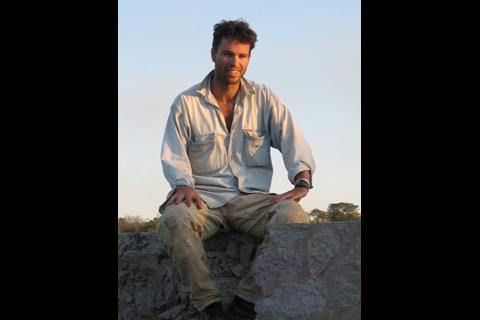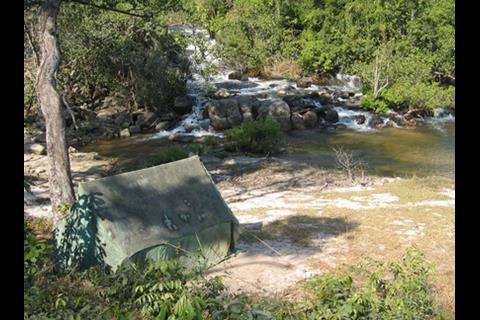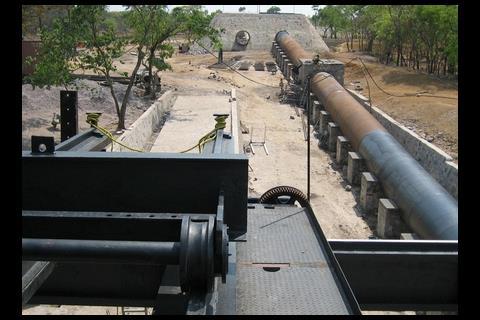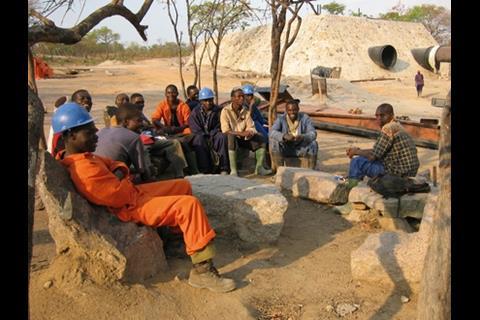Arup engineer Daniel Rea tells Lydia Stockdale how he followed a path trodden by Dr Livingstone and ended up at the ∫√…´œ»…˙TV Awards
You won ConstructionSkills Achiever of the Year at the ∫√…´œ»…˙TV Awards largely thanks to the volunteering work you have done in Zambia. What made you go there?
I was brought up in Zambia – my Dad works in the copper mining industry there and my family has a long history there – my great-grandfather was one of the first explorer missionaries to go there after Livingstone. While I was growing up, I saw the difference good infrastructure and construction could make to people’s lives. I had heard from family contacts about the North West Zambia Development Trust’s plan to build a $2m, 700kWm hydropower scheme. One day, out of the blue, the trust contacted me and said: “We need a site . Can you come?”
The work involved site preparation and civil works, including a powerhouse, a weir and a canal. There were more than 400 people on site when I started and organising their work was intense. My day started before 7am and covered two five-hour shifts on site. After that, I’d travel to a former mission 7km away to use the computer to do admin, then collapse in my tent at about 10pm. Six days a week.
What were you doing when you decided to drop everything?
I was working for Arup’s group and, as always when you’re busy doing a job, your boss doesn’t want you to leave. But mine saw that the work in Zambia would be worthwhile. I went from working in a swish office overlooking Trafalgar Square to being based in a canvas tent on the banks of the Zambezi. I originally went out for six months, after which it was the rainy season and we couldn’t build.
I returned to London for four months, and sat my chartership exams. An engineer was supposed to be taking over my role in Zambia for the next dry season, but his mum got ill and he asked if I could go. It coincided with when I was changing projects at Arup, so there was a natural break.
At 27, you were pretty young to be managing hundreds of people. How did you take control?
It was very difficult. In Zambian culture, respect comes with age. So as a youngster, I had to earn respect. Initially, I was an engineer and someone else was in charge. I demonstrated that I knew the technical side of things and got involved with organising people so, by the time I took over as manager, it was a fairly natural transition. Although I know some Lunda [one of the languages spoken in Zambia], communication was tough. Some days were terrifying. When I first arrived on site, I nearly fell over. I thought it would be a fairly small building. It wasn’t the Hoover Dam, but it was big.
And after Zambia you went to Shanghai …
Yes, I was asked by the UN Industrial Development Organisation to participate in a two-month study tour on hydroelectric power and the developing world. The Chinese wanted to share their expertise in hydropower with Africa, but they did not have the practical experience. I gave a presentation on how we worked with local people and local materials at minimum costs.
Are you still involved with the Zambian development trust now you’re back in London?
I’m a trustee now, so I’m involved in fundraising and working on the website – something I’ve never done before. We are desperately trying to raise the last bit of money needed to finish the project (just a month and few pieces of equipment remaining) and are struggling.
What has been the most difficult career decision you’ve had to make?
There have been lots. Arup sponsored me through university and when I was about to finish, they’d agreed for me to join after I’d worked with an organisation doing disaster relief for a year. But, then I was accepted to do another masters degree on a full scholarship with [sustainable development body] Forum for the Future and Middlesex University. It was an amazing opportunity – luckily, Arup thought so too.
Most recently, after my two months in China, the UN offered me a job based there. I had to weigh up what I wanted and I decided it was to come back to Arup.
What are you doing now and what would you like to do in the future?
Right now, I’m co-ordinating a design team for a masterplan trying to reintegrate the coastline with the historic core of Jeddah, Saudi Arabia. It’s a very exciting time for construction in the UK, never mind the countries abroad that are booming. I want to work in London for now, but in the future I’d also like to work for Arup abroad.
Do you have any words of wisdom to share with other potential “achievers of the year”?
I’d recommend getting sponsorship through university, or at least working through your holidays so you gain an understanding of the working world in relation to your studies.
I’d also advise them to get involved in cross-industry organisations. I served on the Association of London Graduates and Students (ALGS) committee at the Institution of Civil for three years and ended up as vice-chair. It was a great thing to do as it attracts really bright people who are interested in the industry and want to do a bit more than just their job. It’s a way of establishing a network of peers who work for competitors, but are in the same boat.
As you move through your career, they move with you.
Daniel Rea’s CV
Age 29
Job Chartered civil engineer – project management, Arup
Projects Olympic site preparation, London; Zengamina hydroelectric scheme, upper Zambezi River, Zambia; More London Southbank, London; Thames Gateway Regeneration, Ebbsfleet, Kent
Qualifications Masters in professional studies on leadership in sustainable development, Middlesex University; MEng in civil and structural engineering, Bristol University and McGill University, Canada
Postscript
Find out about supporting the North West Zambia Development Trust at www.nwzdt.org. For more on the ∫√…´œ»…˙TV Awards, see





























No comments yet